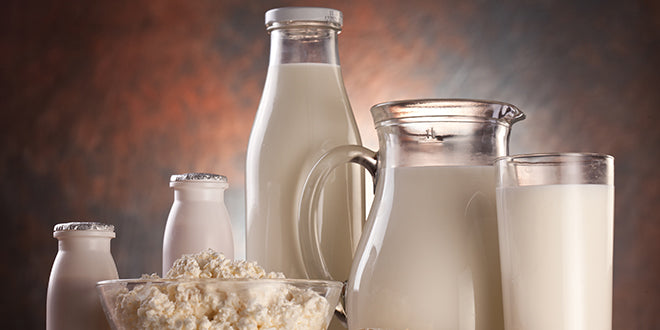Let’s start by blowing out of the water something most people have been taught to believe all their lives... that ‘Milk Does the Body Good.’ I am going to share abundant information with you that reveal just the opposite to be true.
Milk Does A Body Bad!
As we begin this renewal process, I am going to start with a food we have been programmed to accept not only as “good,” but absolutely necessary for good health ever since our earliest childhood: cow milk. A product the dairy industry proclaims, “Milk Does A Body GOOD!” Yet God’s plan for almost the total nutritional intake of a human baby for at least the first year of life is mother's breast milk. On breast milk, a baby will grow strong and healthy and develop a strong immune system (especially if mother is eating a healthy diet). I believe that you will probably agree with me that breast milk is the perfect food for a human baby! I also believe that you would also agree that breast milk is NOT the perfect food for a baby cow.
Now, if we do not believe human breast milk is the perfect food for a baby cow, why do we believe that cow milk is the perfect food for a human baby? Think! We are trying to do some renewing of our minds here, and if we are going to be successful, we must allow ourselves to think outside the box, and to reevaluate what we believe, and why we believe it.”
The Difference Between Human Babies and Calves
I believe that everyone reading this will acknowledge there is a HUGE difference between human babies and baby cows at birth and at maturity. Let’s begin with birth weight:- Human babies usually weigh in the 7 to 8 pound range at birth
- A baby Holstein cow’s birth weight is in the 100-pound range.
- The average human adult, worldwide, is in the 150-pound range.
- A Holstein cow’s mature weight is in the 1,500-pound range.
Next, the protein content of human breast milk is less than 5%, and is designed by God to double the baby’s birth weight in approximately 180 days. The protein content of cow’s milk is approximately 15% (300% of human breast milk protein content) and formulated by God to double birth weight in 45 days. The protein content of rat’s milk is approximately 20% (400% of human breast milk protein content) and designed to double birth weight in 5 days. Please note the correlation between percentage of protein and time necessary to double birth weights.
Now with our thinking cap on, does it not make sense to acknowledge that God knew what He was doing when he created each animal species, and that He knew what he was doing when He specifically formulated the milk of each species exclusively for that particular species? In nature, other than an extraordinarily rare circumstance of one species nursing the orphaned offspring of another, you will not find an animal of one species ever consuming the milk of another species on a regular basis. Are animals in the wild possibly wiser than we so-called intelligent humans?
Dr. T. Colin Campbell, PhD, a prestigious nutritional biochemist, and author of the China Study writes: “Isn’t it strange that we’re the only species that suckles from another species.” And though Dr. Campbell grew up on a dairy farm and prided himself that he could drink a gallon or more of milk a day, after years of research he’s convinced that cow’s milk is responsible for a huge share of our nation’s physical problems. The bottom line for Dr. Campbell is simple: “It’s unnatural to drink milk.” Think about that statement for a moment. How many animals in the wild “DRINK” milk after weaning? The answer – NOT A SINGLE ONE! Might the animals in the wild be wiser by instinct than we humans are by following the teachings of the nutritional experts and the advertising of the milk producing industry of this world? Remember, the Bible tells us: “The wisdom of this world is foolishness with God.” (1 Corinthians 3:19).
There are some 5,000 species of mammals on earth, and God formulated the milk of each species for that specific species.
As we continue, we are going to learn that when we attempt to nourish a human baby, child, teenager, or adult with cow’s milk — milk coming from another species of animal — it becomes one of the most foolish and dangerous things we can do. And it doesn’t matter whether the milk is organic or not! Both are equally dangerous and destructive to the human body!
Cow's Milk Protein: 87% Casein
Casein is a powerful binder, a polymer used to make plastics, and the glue used in making sturdy furniture. It can also be found in many foods as a binder. But it is also a powerful allergen, causing a histamine release that creates excess mucus, and is responsible for many of our children’s physical ills. Of even greater concern is that casein, according to Dr. Campbell in his book “The China Study,” was found to grow cancer faster than any other thing fed to cancer-induced rats. In his research, Dr. Campbell found that casein, which makes up 87% of cow’s milk protein, consistently and strongly promoted all stages of cancer development. Alternatively, proteins obtained from plants did not promote cancer at all, even at higher levels of intake. Also, of serious concern regarding cancer is that one of those 59 hormones found in cow milk is insulin-like growth factor-1 (IGF-1), a key factor in the rapid growth and proliferation of breast, prostate, and colon cancers, and is suspect in the growth of ALL cancers.
Is Cow's Milk The Best Source of Calcium For Bone Health?
Where do cows get the calcium that builds their big bones? They get it from the green grass they eat! The calcium in plants has a large amount of magnesium, a mineral necessary for the body to absorb and use the calcium. The calcium in cow’s milk is basically useless in building bones, because it has insufficient magnesium content.Those nations with the highest intake of milk/dairy consumption have the highest rates of osteoporosis.
Cow’s milk has 300% of the calcium of human breast milk, but it is not very usable because in order to be absorbed and used there must be an adequate quantity of magnesium. When a cow eats grass, that cow gets all the calcium it needs for their big bones only because grass contains a substantial amount of magnesium. When humans consume large quantities of greens, they not only get the calcium the body needs, but the magnesium needed by the body to utilize that calcium. Interestingly, though cow’s milk contains 300% of the calcium of human breast milk, it only has enough magnesium to absorb around 11% of that calcium. Another serious concern here is the acidity of cow’s milk. The more milk and cheese, along with animal flesh a person consumes, the more acidic the body becomes. In an effort to neutralize this acidity, the body removes calcium (an alkaline mineral) from the bones to neutralize that acidity, thus creating soft bones and ultimately osteoporosis and hip fractures. Disparities between calcium intake and bone health can be seen worldwide. The more dairy that people consume, the more susceptible they become to hip fractures. The 12-year Harvard Nurses’ Health Study, involving 78,000 nurses, found that those who got the most calcium from dairy products had approximately double the hip fracture rate, compared to women who got little or no calcium from dairy products. In other words, the more dairy in your diet, the higher your risk of breaking bones.
Basic Composition of Cow's Milk
All milk originating from a cow, whether it be commercial or organic, contains 59 active hormones, scores of allergens, fat, and cholesterol. Most cows’ milk has measurable quantities of herbicides, pesticides, dioxins, up to 52 powerful antibiotics, blood, pus, feces, bacteria and viruses. Remember... cow’s milk (and beef, for that matter) may contain traces of anything the cow ate – including such things as radioactive fallout. There's a lot more fat in milk and dairy products than you might think:- Whole milk derives 49% of its calories from fat
- 2% milk derives 35% of its calories from fat
- Cheddar cheese derives 74% of its calories from fat
- Butter derives 100% of its calories from fat
Most folks have no idea just how much fat is in milk and dairy. Americans who are overweight or obese need to understand that milk, ice cream, cheeses, yogurts, and all other products derived from cow milk are most likely a significant cause for their weight problem.
Homogenization
Large fat molecules from un-homogenized cow’s milk cannot get through the intestinal wall and into the blood stream; this is a good thing, the way God intended. But when milk is homogenized, cream no longer rises because homogenization breaks up those large molecules into small ones that DO get into the bloodstream! This becomes a dangerous, unnatural expressway for any fat-borne toxins (lead, dioxins, etc.) to get into the blood.
Is it any wonder why one of the top "killer" foods we avoid on The Hallelujah Diet is dairy? The truth is, you don't need dairy. Your body will do just fine (and most assuredly, even better) without it! If you are not already on The Hallelujah Diet, we encourage you to give it a try! Multitudes have made this diet change that we teach here at Hallelujah Acres, and experienced normalization of weight, as well as the elimination of almost all their physical problems.








